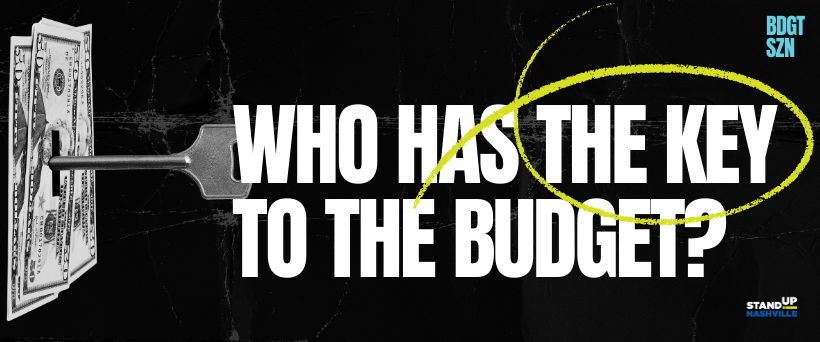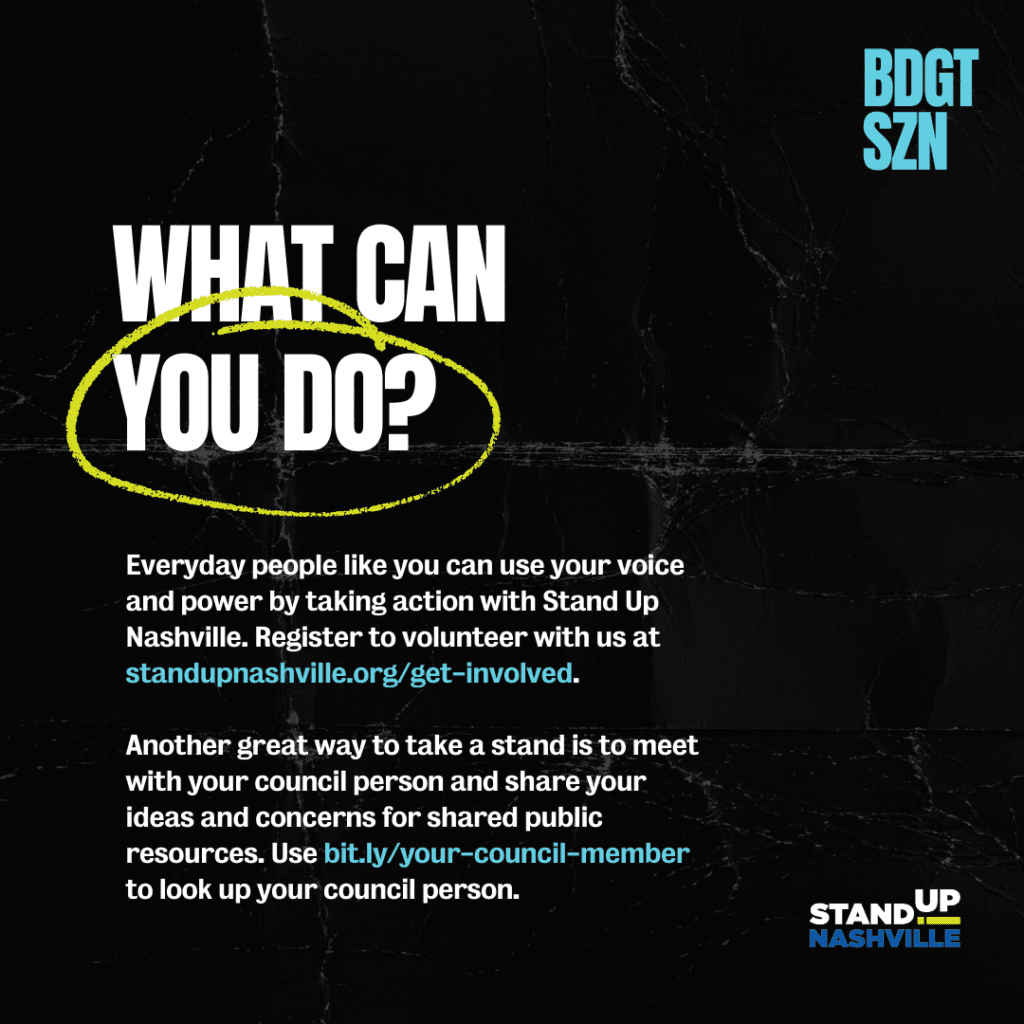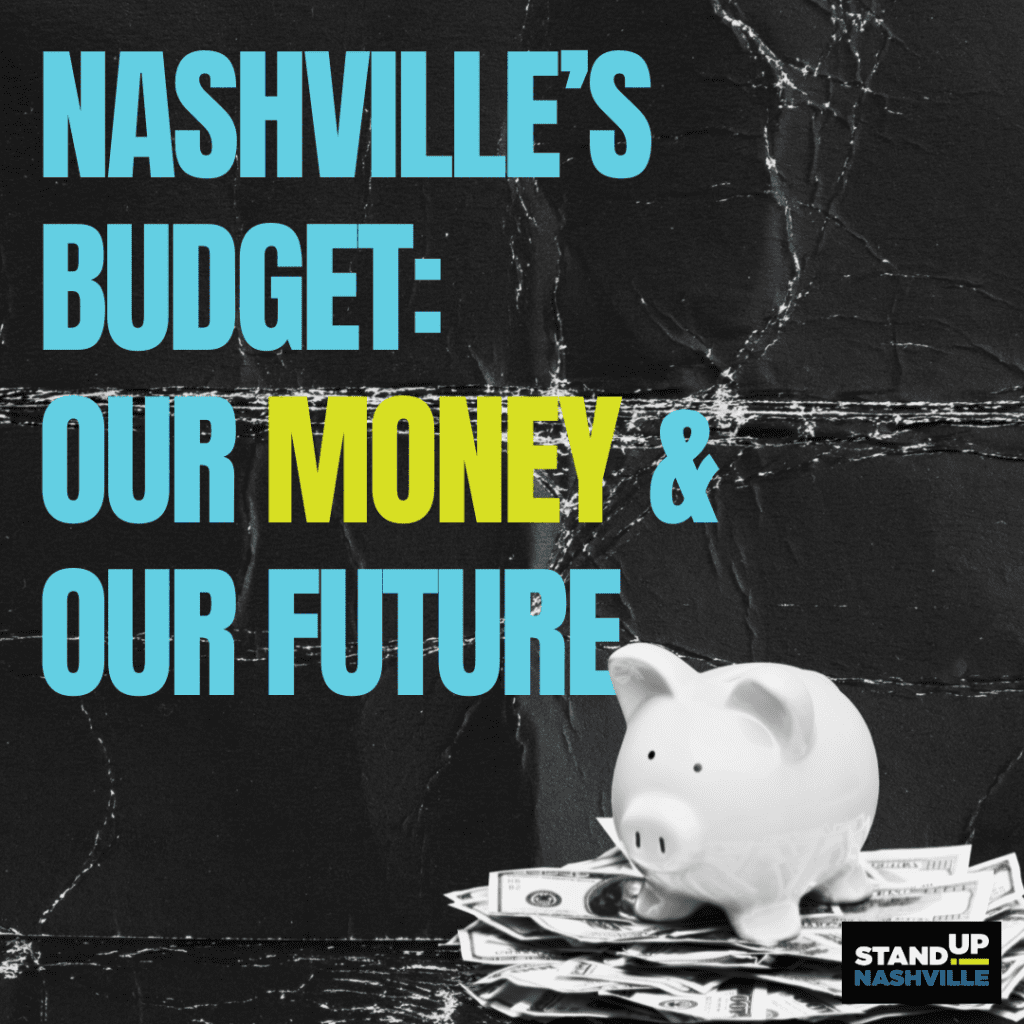A charter is an official document that outlines the governing system for a city. As for the budget process, the Metro Nashville charter sets the key dates and responsibilities, including giving the most power to the mayor to drive the process. Let’s dig into this budget power!
With the mayor initiating discussions and setting the terms, it inevitably causes the council to be reactive. Additionally, our city’s charter is guided by the concept of a “strong mayor system”. It specifies that all 40+ Metro departments operate under the mayor. For example, the Finance Director is hired by and beholden to the mayor, not the Metro Council. When compared to the council’s office that has 12 staff members who work with the 40-member council to research and write legislation, there’s a vast difference in what the council is practically and legally able to do.
The council’s power is in the form of amendments and their own budget, known as the Substitute Budget. Typically, this budget is passed to become the final budget. Although historically, it only changes less than 1% between the mayor’s recommended budget. Yes, a whopping less than 1%.
The other 1%
While the percentage of change is small, it holds significant weight when fulfilling the requirement of having a structurally-balanced budget.
Think about your personal finances. In the best of circumstances, you have disposable income. Meaning, there’s more money coming in than what you need to go out for rent or mortgage, utilities, and basic necessities. This gives you the financial freedom to increase your savings and investments, plan a vacation, or buy that cool gadget you’ve been eyeing. But the city’s budget isn’t like that.
Metro Nashville operates on a structurally-balanced budget that requires every amount that comes in as revenue to go out as an expenditure. It’s the same as if you operate your personal budget using the zero-budget method, where $5,000 monthly income minus $5,000 expenses (bills, savings, donations, etc.) equals zero. If council was to increase teacher pay, the money would have to be reallocated from somewhere else, or they would need to raise taxes in order to create a new revenue stream.
As a result, council members often look to make changes to items the mayor has overstated in the recommended budget. Without new revenues, council has to raid various line items and funds in the mayor’s budget to scrounge up a few bucks – it’s like having to look for change in the sofa cushions just to get by on your light bill. Traditionally, funds have been reallocated from the 4% fund, the Fund Balance, and various contingency funds. But in recent years, even these funds are becoming less and less available for council to reallocate.
Despite the gravity of political decisions on how to reallocate that 1%, the bottom line is that it is not enough money and each year there is a high stakes fight for funds to ensure existing programs or worker salaries even match the pace of inflation.


Everyone wants something
Since the budget is a limited pot of money, some departments may get the budget increases they request, and others may lose funding. As the budget is debated in Metro Council, council members will advocate for programs they care about and projects for their districts – after all it is a part of why they were elected. Similarly, advocacy and interest groups will lobby to get their priorities funded. Some of the larger players are business groups, public employee unions, and nonprofit organizations.
There is a finite amount of resources available, so not everything can be funded. Well, that’s unless groups propose to increase revenue through increased taxes or fees. In that case, groups must determine the issues that require funding, associated program costs, and what competing groups are advocating for.
Separately, Metro Council’s substitute budget is required to pass with 21 out of 40 votes. Due to the number, it creates an opportunity for the mayor to secure favor and votes for the recommended budget. As a result, council makes small changes to its substitute budget to avoid it failing and the mayor’s recommended budget becoming law.
Other budget barriers
Fixed, or recurring, costs are expenditures that recur yearly and must be covered by revenue. Each is valuable to the city’s services, operations, and residents’ quality of life. Here are a few examples of fixed costs:
- The cost of living adjustment for Metro Nashville Public School staff sets a new baseline of pay that the city cannot drop below the next year.
- The city must service its debt, meaning both principal and interest on all bonds. In FY2024 debt service was 13% of the budget.
- Every department must be funded a minimum percentage to be operational.
The tight budget timeline is a barrier because there’s more that needs to be addressed than there is time to address it all. While the mayor has a year to prepare his next budget proposal, the council has two months to review and respond. Past years have indicated that the council has only had a few days to review the mayor’s recommended budget, which is often 700+ pages. The council then requests its substitute budget be prepared, which takes two weeks. This basically guarantees that large scale changes aren’t an option.
What are you thinking? Yikes. Wow. OMG. *shakes head*. We get it. Take a deep breath and let it out. The good news is that you’ve made it through our introduction on the budget!
Thanks for being on this budget journey with us. Please spread the love by sharing the series with someone else via email and on social media.
Remember, you have power! Now that you know how to find your council member, send them an email or call them about something you want to see more support for in the budget.










